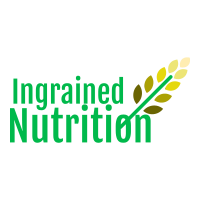Iron
Iron has an important role in transporting oxygen around the body. Iron can be sourced from both animal and plant-based foods, however plant-based sources of iron (non-haem) are no as easily absorbed as the type of iron in animal products (haem iron). People following a vegan diet can get enough iron through plant foods like legumes, tofu, nuts and seeds, wholegrains (especially amaranth and quinoa), dried fruits and dark green leafy vegetables. However, the type of iron in plant foods (non-haem iron) is not as easily absorbed as that in animal foods (haem iron). To boost the absorption of iron from plant foods, include a vitamin C-rich food with meals such as broccoli, capsicum, kiwi fruit, and strawberries. Avoid drinking tea and coffee with meals as tannins in tea and coffee inhibit iron absorption) and avoid taking calcium supplements with meals.
Protein
Protein is an important macronutrient with a primary role in growth and repair of all body cells, formation of enzymes and hormones, normal functioning of muscles and nerves and immune protection. Protein is often primarily sources through consumption of meat, chicken, fish, eggs and dairy products. Plan based food sources include: Legumes such as beans, lentils, chickpeas, soy foods such as tofu, tempeh, soy milk, soy yoghurt, textured vegetable protein (TVP), nuts and seeds, quinoa, amaranth grain, wholegrains
Vitamin B12
Vitamin B12 is only found naturally in animal products, so without these, it’s essential to eat foods fortified with vitamin B12 such as some plant based milks, vegetarian burger patties or take a vitamin B12 supplement. Supplements should be taken under the guidance of a doctor or dietitian.
Calcium
Important for strong bones and teeth, proper nerve and muscle function and blood clotting calcium is primarily sourced through dairy products. Vegan sources of calcium include: Calcium-fortified foods (eg soy, nut, oat and rice milks and fruit juices), almonds, brazil nuts, sesame seeds, unhulled tahini (sesame seed paste), amaranth grain, dried apricots, figs, soybeans, calcium set-tofu, Asian greens, kale, collard greens, and broccoli.
Tips to increase absorption of calcium:
- Ensure adequate vitamin D
- Limit salt intake – salt increases calcium excretion
- Limit caffeine intake – caffeine (in tea, coffee, cola and ‘high energy drinks) inhibits calcium absorption
- Phytic acid found in bran and raw vegetables inhibits absorption so have some of your vegetables cooked and choose wholegrain breads and cereals instead of adding bran
Omega-3 fatty acids
Our body can’t make omega-3 fats itself, so it’s important to get them through food. Marine sources of omega-3 fats provide the most health benefits. Plant sources contain a different type of omega-3 fat to marine sources. Plant sources of omega-3 fats include linseeds/flaxseeds, walnuts, chia seeds, soy bean oil and canola oil. There are also vegan marine omega-3 fat supplements available.
Zinc
Found in every part of our body and has a wide range of functions. It is important for wound healing, healthy skin and a strong immune system
Food Sources: Legumes, grains, nuts, seeds, soy foods (eg tofu, tempeh, soy milk, soy yoghurt).
Tips to increase zinc absorption:
- Soak legumes before cooking or use canned legumes
- Consume sprouted beans, grains and seeds and bread that contains yeast
- Consume foods containing organic acids such as citric acid (in fruit and vegetables) at meals
If you have been following a vegan diet long-term or are contemplating this lifestyle, we recommend speaking to a dietitian to ensure this diet is right for you, your health and to assist you in achieving a balanced intake.




